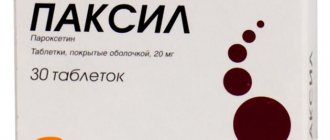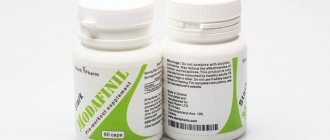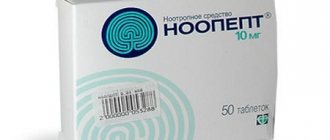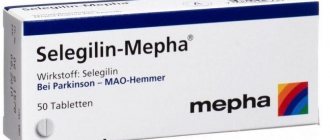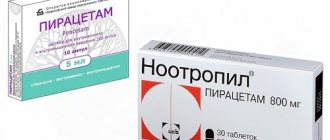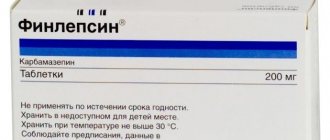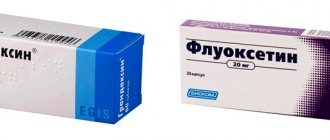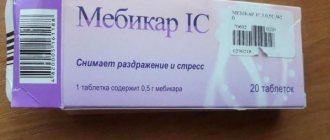Dosage form
The drug is available in several dosage forms - capsules, tablets for oral administration and solution for parenteral administration.
The tablets are white, round in shape, and have a biconvex surface. The package contains 12 or 30 tablets and an annotation.
The capsules are oblong in shape and white in color. Inside contains a white or cream-colored powder. They are packaged in blister packs of 12 pieces. A cardboard pack contains 2 blisters.
The solution for parenteral administration is a colorless transparent liquid, which is contained in 2 ml ampoules. A cardboard pack contains 12 ampoules.
Description and composition
The active active compound of the drug is sulpiride. Its concentration depends on the dosage form:
- 1 tablet – 50 and 200 mg.
- 1 capsule – 50, 100 and 200 mg.
- 1 ml of solution for parenteral administration – 50 mg.
The tablet contains the following auxiliary components:
- Potato starch.
- Gelatin.
- Magnesium stearate.
- Lactose.
- Microcrystalline cellulose.
- Talc.
The dosage form of the capsule for oral administration includes the following auxiliary components:
- Corn starch.
- Magnesium stearate.
- Gelatin.
- Lactose monohydrate.
- Pregelatinized starch.
- Titanium dioxide.
The solution for parenteral administration contains water for injection, sodium chloride and sulfuric acid (0.2 M solution) as additional compounds.
Pharmacokinetics
After intramuscular administration of sulpiride at a dose of 100 mg, Cmax in plasma is achieved after 30 minutes, after oral administration at a dose of 200 mg - after 4.5 hours. Bioavailability when taken orally is 25-35% and is characterized by significant individual variability.
The concentration of sulpiride in plasma is proportional to the dose.
Plasma protein binding is no more than 40%. Sulpiride quickly penetrates into all tissues of the body, faster into the liver and kidneys, slower into brain tissue (the main amount accumulates in the pituitary gland). 0.1% of the daily dose of sulpiride is excreted in breast milk.
Excreted unchanged by the kidneys through glomerular filtration (92%). The total clearance (usually equal to the renal clearance) is 126 ml/min. T1/2 - about 7 hours.
Pharmacological group
Sulpiride is an atypical antipsychotic from the chemical group of compounds substituted benzamides. It has a predominantly blocking effect on dopaminergic receptors of the structures of the limbic system of the brain. At the same time, the compound has virtually no effect on the neostriatal system, serotonin, histamine, adrenergic, cholinergic receptors, as well as gamma-aminobutyric acid receptors. Due to biological and physiological effects, the drug has a neuroleptic, stimulating and antidepressant therapeutic effect.
The antipsychotic effect of the drug is realized when used in high doses. In small therapeutic dosages, sulpiride helps fight dizziness, regardless of its origin, and also improves the mental state of a person with concomitant chronic somatic pathology, in particular peptic ulcer disease and irritable bowel syndrome.
After taking the tablet orally, sulpiride is absorbed into the blood. It penetrates through the blood-brain barrier into the tissues of the central nervous system, where it has therapeutic effects. The compound is not metabolized; it is excreted unchanged from the body in the urine.
pharmachologic effect
Antipsychotic drug (neuroleptic) from the group of substituted benzamides. It has a moderate antipsychotic and antidepressant effect in combination with an activating effect. The mechanism of antipsychotic action is associated with selective blockade of central dopamine D2 receptors. The sedative effect is weak, alpha-adrenergic blocking activity is low, and practically does not cause antimuscarinic effects. Rarely causes extrapyramidal disorders, therefore it is classified as an “atypical” antipsychotic. Promotes the healing of ulcerative lesions of the stomach and duodenum.
Indications for use
The drug is used to treat various mental disorders and dizziness.
for adults
There are several medical indications for the use of the drug:
- Acute psychosis, delirious states.
- Neurotic changes.
- Schizophrenia with acute or chronic course.
- Dizziness of varying severity and origin, including as a result of the development of vestibular neuritis, otitis media, vertebrobasilar insufficiency, Meniere's disease, conditions after a traumatic brain injury.
- Depression (long-term and severe decrease in mood) of various origins.
- Peptic ulcer localized in the stomach, duodenum, irritable bowel syndrome - the drug is prescribed as an additional means of complex therapy.
for children
For adolescents over 14 years of age, the drug is prescribed for the same indications as for adult patients.
for pregnant women and during lactation
Prescription of a medication can only be carried out by the attending physician according to strict medical indications. The medicine is not used during lactation.
Instructions for use of Sulpiride
The drug Sulpiride belongs to the pharmacological group of neuroleptics - antipsychotic drugs, that is, potent sedatives. Its active component is a chemical derivative of the substance diazepine, which has an inhibitory effect on the central nervous system. In psychiatry it is used as part of the complex treatment of mental and neurotic disorders. Can be used as an antiemetic; in small dosages it is effective against dizziness of any etiology.
Composition and release form
The main forms of release are tablets for oral administration, solutions for oral administration and intramuscular administration . White, round tablets with a flat-cylindrical surface may contain 50 or 200 mg of the active ingredient - Sulpiride, packaged in 10 pieces in blisters. One package contains three blisters and instructions for use. The oral solution contains 200 mg of the active ingredient for every 5 ml (150 ml in a bottle), for injection - 50 mg per 1 ml (ampoules of 2 ml, 5 or 10 ampoules per package).
| Release form | Main active ingredient | Auxiliary components |
| Tablets, 200 mg | Sulpiride (200 mg) | Potato starch, magnesium stearate, lactose, microcrystalline cellulose, gelatin, talc |
| Oral solution, 150 ml | Sulpiride (200 mg per 5 ml) | Propylhydroxybenzoate, methyl parahydroxybenzoate, propylene glycol, liquid maltitol, anise flavor, citric flavor, citric acid monohydrate, purified water |
| Solution for intramuscular injection, 2 ml | Sulpiride (50 mg per 1 ml) | Sodium chloride, sulfuric acid, purified water |
Pharmacodynamics and pharmacokinetics
The drug belongs to the group of atypical benzamide neuroleptics (new generation antipsychotics with few side effects). The active component has a moderate antipsychotic effect due to its mechanism of action . It suppresses the activity of limbic dopaminergic receptors without affecting the neostriatal system. The secondary effect is associated with inhibition of presynaptic receptors. Regulates the production of dopamine, the deficiency of which experts associate with the development of depression.
The drug does not affect serotonin, histamine, cholinergic receptors and gamma-aminobutyric acid neurotransmitters. The antidepressant and stimulating effect occurs when taken in daily doses of up to 600 mg, the antipsychotic effect occurs when taking doses of 600 mg and above. In small doses (from 50 to 300 mg per day) it has an antiemetic (antiemetic) effect, relieves dizziness of any nature, and psychosomatic symptoms of peptic ulcer disease.
When taken orally, the highest concentration of Sulpiride in the blood occurs after 5-6 hours, bioavailability is no more than 35%. It is excreted unchanged by the kidneys without the formation of metabolites; the half-life is about 8 hours. When used intramuscularly, the maximum concentration occurs after 30 minutes, the reaction rates with blood proteins and bioavailability are about 40%, the largest accumulation of the active component is observed in the pituitary gland. It is excreted by the kidneys, the half-life is 7-8 hours.
Indications for use of Sulpiride
Sulpiride tablets or a course of drug injections are prescribed as monotherapy or as part of complex treatment of severe mental or neurotic disorders. The drug is indicated for severe symptoms of the following diseases and conditions:
- schizophrenia in acute or chronic stages;
- depressive disorders of various nature;
- delirious disorders are acute psychoses accompanied by hallucinations, increased motor or mental activity.
It can be used as an auxiliary means of relieving psychosomatic manifestations that develop against the background of peptic ulcer disease, as well as to reduce abdominal pain and generally improve well-being in irritable bowel syndrome. Prescribed to relieve dizziness after traumatic brain injury, during the course of vestibular neuritis, otitis media and other diseases.
Contraindications
There are several contraindications, in the presence of which the patient is excluded from using the medication:
- Hypersensitivity to sulpiride.
- Epilepsy.
- Hyperprolactinemia.
- Lactation period.
- Parkinson's disease with severe motor impairment.
- Impaired digestion and absorption of certain carbohydrates in the intestine, which is usually of congenital origin.
- Acute intoxication associated with drinking large amounts of alcohol, overdose of analgesics, sleeping pills.
- Pheochromocytoma.
- Prolactin-dependent neoplasms, including breast cancer.
- An acute change in mental state, accompanied by a state of passion, expressed aggression.
- The child's age is up to 14 years.
- Galactosemia.
Sulpiride is prescribed with caution for concomitant renal and liver failure, pathology of the heart, blood vessels, and high blood pressure.
Use of the drug Sulpiride
Adults. Schizophrenia: recommended daily doses are from 200 mg to 1200 mg, usually prescribed 400–800 mg/day in 2 divided doses depending on the symptoms of the disease. The maximum daily dose is 1200 mg. Psychofunctional disorders, neurosis: 150–300 mg/day. Migraine and dizziness (Meniere's syndrome): 50–200 mg/day. Peptic ulcer of the stomach and duodenum: 50–100 mg 3 times a day. The use is complementary and should be combined with antiulcer drugs (ganglionic blockers, astringents and enveloping agents). Elderly patients: Use normal adult doses. The dose is reduced in the presence of renal dysfunction. In patients with renal failure, the dose of the drug is reduced as follows: creatinine clearance:
- 30–60 ml/min – 70% of the standard dose;
- 10–30 ml/min – 50% of the standard dose;
- ≤10 ml/min - 34% of the standard dose.
The drug is usually taken in 2 doses. Sulpiride should be taken at least 1 hour before or 2 hours after meals, since the presence of food in the stomach reduces the absorption of the drug by 30%. Sulpiride should not be taken simultaneously with antacids and sucralfate, or for at least 2 hours after taking the latter. The duration of treatment depends on the patient's condition.
Applications and dosages
Capsules and tablets are intended for oral administration. They should not be chewed and should be taken with sufficient liquid. The solution is administered intramuscularly or intravenously with mandatory adherence to the rules of asepsis and antisepsis aimed at preventing secondary infection of the patient.
for adults
The average therapeutic dose depends on the medical indications for use of the drug:
- Schizophrenia, derilia, psychosis - the initial dose is 0.6-1.2 g of sulpiride per day, as the desired result is achieved, they switch to a maintenance dose, which is 0.3-0.8 g per day.
- Depression of various origins - the dose varies from 0.15-0.2 to 0.6 g per day.
- Severe dizziness - 0.15-0.2 g per day, if necessary, increase the dose to 0.3-0.4 g per day. The average duration of use of the drug is 2 weeks.
- Peptic ulcer, irritable bowel syndrome - the drug is prescribed as an adjuvant therapy 0.1-0.3 g per day, the dose is divided into 2 doses.
For patients with concomitant renal failure, the dosage is reduced in the elderly.
for children
The dosage for adolescents over 14 years of age is calculated based on 3-5 mg of sulpiride per 1 kg of patient body weight.
for pregnant women and during lactation
The dosage is determined only by the attending physician on an individual basis.
Reviews
Olga, 28 years old
Taking Sulpiride during severe postpartum depression helped me after eight weeks of use. The dosage was adjusted by the doctor and increased over 28 days to 1000 mg per day (5 tablets). Sleep gradually returned and panic attacks stopped. Throughout the course I constantly wanted to sleep and felt nauseous. I had to give up breastfeeding.
Maxim, 54 years old
The mother was diagnosed with schizophrenia, and Sulpiride was prescribed as part of maintenance treatment. The product is strong, the dosage was adjusted to the minimum - 2 tablets of 200 mg per day. There have been no exacerbations for a year and a half, and he feels better. While taking it, there are problems with blood pressure and heart rate, but sleep has returned to normal.
Igor, 36 years old
After a skull fracture, severe headaches and dizziness began; analgesics did not help. I took a course of this drug – two weeks, one and a half tablets (300 mg) per day. I felt sick from time to time, but the dizziness stopped on the fifth day of treatment. I had to temporarily stop driving due to drowsiness.
Side effects
The use of the drug can lead to the development of negative reactions from several organ systems:
- Digestive system - dry mouth, nausea, periodic vomiting, constipation, heartburn, increased activity of liver transaminase enzymes (AST, ALT) in the blood, which is evidence of damage to hepatocytes.
- Nervous system - sedation, drowsiness, headache, periodic dizziness, extrapyramidal syndrome with motor disturbances, irritability, anxiety, speech impairment, hand tremors, psychomotor agitation, sleep disturbances, decreased visual acuity.
- Cardiovascular system - changes in the level (increase or decrease) of systemic blood pressure, tachycardia, prolongation of the QT interval on the ECG, arrhythmia.
- Endocrine system - reversible development of hyperprolactinemia with galactorrhea and menstrual irregularities in women or impotence and gynecomastia in men.
- Allergic reactions - skin rash, itching, hives, swelling.
Overdose
It is possible to be poisoned by sulpiride. There are no specific symptoms indicating poisoning, but you should be wary if the following signs appear:
- Blurred vision.
- Arterial hypertension.
- Dry mouth.
- Increased sweating.
- Development of neuroleptic malignant syndrome.
- Drowsiness.
- Nausea and vomiting.
- Extrapyramidal symptoms.
Since there is no specific antidote, rescue measures are aimed at symptomatic and then supportive therapy.
Interaction with other drugs
Sulpiride may interact with drugs from other pharmacological groups, which is accompanied by changes in effects or the development of negative reactions:
- Strengthening the sedative effects of drugs that suppress the activity of the central nervous system (narcotic analgesics, benzodiazepines, barbiturates, anxiolytics) and alcohol.
- Development of orthostatic hypotension during the use of antihypertensive drugs.
- Reducing the therapeutic effects of dopaminergic receptor agonists (apomorphine, cabergoline, lisuride, piribedil, kinagolide, amantadine, bromocriptine, entacapone) and antipsychotics.
- Increased risk of arrhythmia when prescribing antiarrhythmic drugs of class 1a (disopyramide, quinidine), antipsychotics, drugs that lead to a decrease in the level of potassium in the blood (potassium-removing diuretics).
- Reduced bioavailability of sulpiride while taking antacids and sucralfate.
Medicines analogues
The drug "Sulpiride" is an atypical antipsychotic belonging to the group of substituted benzamides - it has a fairly large number of medications that are similar in composition and effect. There are drugs that match the level 4 ATC code. These are Betamax, Tiaprid, Eglonil. In addition to these, “Prosulpin”, “Eglek”, “Restful”, “Vero-Sulpirid”, “Sulpirid Belupo” are in wide consumer demand. Reviews of all these medications from consumers can be both positive and negative. It all depends on the severity of the patient’s health condition, his sensitivity to the main active ingredient - sulpiride, and on the dosage of the drug prescribed by the attending physician.
special instructions
There are several special instructions for the correct use of the drug:
- The drug lowers the seizure threshold, so patients with a history of epilepsy undergo an electrophysiological study before being prescribed.
- The development of hyperthermia (pronounced increase in body temperature) is grounds for discontinuation of the medication.
- During drug therapy, it is prohibited to perform work associated with increased concentration and speed of psychomotor reactions.
Use of sulpiride during pregnancy and lactation
Animal studies have not revealed embryotoxic or fetotoxic effects of the drug; human experience shows similar results. However, due to the insufficiency of some data obtained during human studies, the use of sulpiride during pregnancy is recommended only under strict indications. After delivery, newborns should be further examined, as there are isolated cases of extrapyramidal side effects.
Sulpiride penetrates into the milk of nursing women. Because the effects are unclear, women should not breast-feed while being treated with this drug.
Analogs
On the modern pharmaceutical market there are structural analogues of the drug Sulpiride.
Eglonil
The drug is presented in several dosage forms - capsules, tablets, solution for parenteral administration. The medication is prescribed for the treatment of certain mental changes in adults and children over 6 years of age. Pregnant women use the medicine with caution.
Prosulpin
The medicine is available in tablet form. It contains sulpiride and is used for the treatment of mental pathology and severe dizziness of various origins. The drug is intended for children and adults; it is used with caution in pregnant women.
Alternative drugs
Finally, it is worth paying a little attention to the analogues of Sulpiride. Medicines that can completely replace this drug include:
- Betamax.
- "Sulpiride Belupo".
- "Eglek."
- "Eglonil."
- "Vero-Sulpiride".
- "Prosulpin."
These drugs contain the same substance and are prescribed, respectively, to treat the same conditions.

